We may not have the course you’re looking for. If you enquire or give us a call on 01344203999 and speak to our training experts, we may still be able to help with your training requirements.
Training Outcomes Within Your Budget!
We ensure quality, budget-alignment, and timely delivery by our expert instructors.
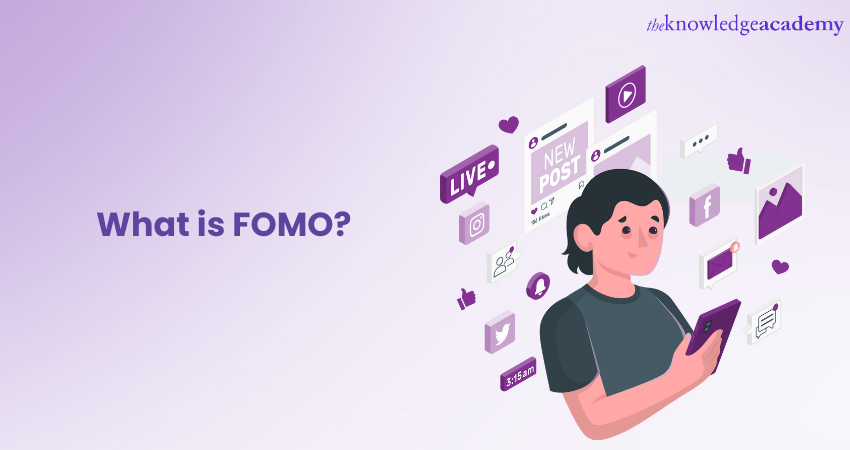
According to Eventbright 69% of millenials suffer from FOMO.? Now, What Is FOMO? The emotion of "Fear of Missing Out" (FOMO) arises from the sense that others are missing out on significant possibilities or are leading better, more fulfilling lives. FOMO frequently fuels stress and anxiety among youngsters. Teenagers claim that FOMO drives them to use technology to let others know what they are doing and how much fun they are having doing it.
This psychological phenomenon is based on the perception that others are having more better experiences in life in comparison to the particular individual. Although the phrase is brand-new, the sentiment is not. You might often question if the grass is greener on the other side. It's never sure whether someone else is having a better life, earning more money, or having access to more chances.
FOMO is as a feeling of anxiety or unease that can arise when a person is concerned about missing out on something, typically a social event or activity as mentioned above. This blog will help you understand What is FOMO and offers guidance on how to deal with it.
Table of Contents
1) History of FOMO: When did it all start?
2) What is FOMO?
3) What causes FOMO?
4) Effects of FOMO
5) How to get over FOMO?
6) Conclusion
History of FOMO: When did it all start?
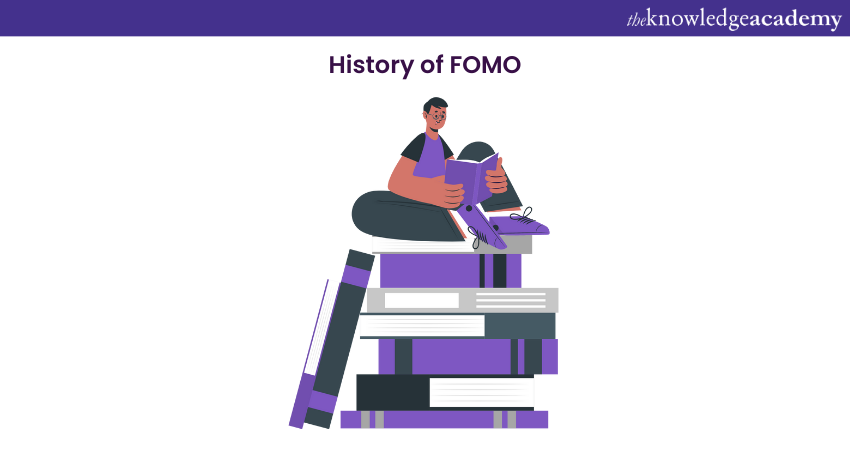
It is familiar to our time that you can miss out on a fun experience. The meaning of Fear of Missing Out was first given in 1996 in a study report by marketing expert Dr Dan Herman, who suggests that FOMO has probably occurred for a very long time (you can find references to it in ancient books). According to studies, around 70% of all adults in developed nations experience the uncomfortable, often overwhelming feeling that something is happening and they aren't a part of it.
It consists of two processes: first, the feeling that one is missing out, and second, an obsession with keeping up these social relationships. It is related to a range of negative life experiences and feelings as it is considered to be a problematic attachment to social media.
What is Fear of Missing Out?
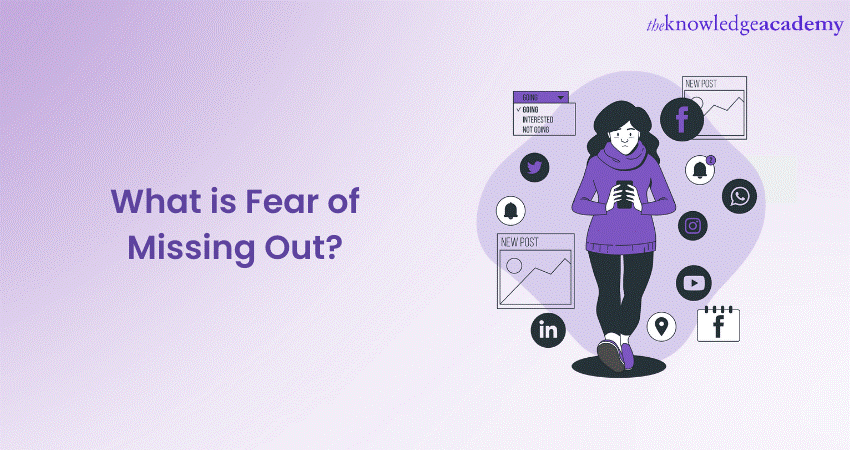
The Fear of Missing Out is majorly pertinent to the stress or Fear of Missing Out on things like:
a) Social occasions
b) Gatherings
c) The most recent rumours or news
Now, where did the term FOMO come from? Caterina Fake, an entrepreneur, coined the phrase FOMO. It is a modern-day version of "keeping up with the Joneses." People now strive to keep up with hundreds, even thousands, of social media friends and followers, compared to the handful of neighbours they used to try to keep up with.
It can occur when you aren't invited to a party, your coworkers leave the office without you, or you need to follow the newest social media trends. This can also be as easy as regularly checking your text messages. It might also appear as signing up for activity despite the chance of burnout due to a busy schedule or picking up your phone right away when you receive a notification.
Strong correlation between social media and the Fear of Missing Out
FOMO is closely tied to the human need for belonging and can have both physical and Mmental Hhealth implications. Social media platforms like Facebook, Tik Tok and Instagram play a significant role in fuelling FOMO. These apps can have a powerful impact on our emotions due to the way they trigger the brain's reward system.
When we encounter posts that bring us joy on social media or receive positive feedback in the form of likes and comments on our own posts, it leads to a surge in dopamine, a neurotransmitter associated with pleasure and reward. This dopamine release makes the brain's reward system light up, and it reinforces the desire for more positive interactions on social media.
Essentially, the act of posting on social media and the subsequent positive feedback create a rewarding loop that the brain craves, akin to an addiction. The continuous pursuit of this positive feedback can drive individuals to spend more and more time on these platforms, seeking that pleasurable response.
FOMO, age, and gender
FOMO is not exclusive to a specific age group; people of all ages can experience it, according to various studies. FOMO has also been linked to increased smartphone and social media usage, and this connection is not dependent on age or gender.
While FOMO likely results from a combination of factors, social media and problematic smartphone usage play significant roles. Smartphone usage is associated with concerns about how others perceive them, both negatively and positively, and it can affect one's mood adversely.
Research suggests that FOMO in some teens can contribute to issues like anxiety, depression, low self-esteem, and engaging in risky behaviours. FOMO can intensify peer pressure, pushing teens to participate in actions they might otherwise avoid, as the still-developing teenage brain may not fully consider the long-term consequences.
What causes FOMO?
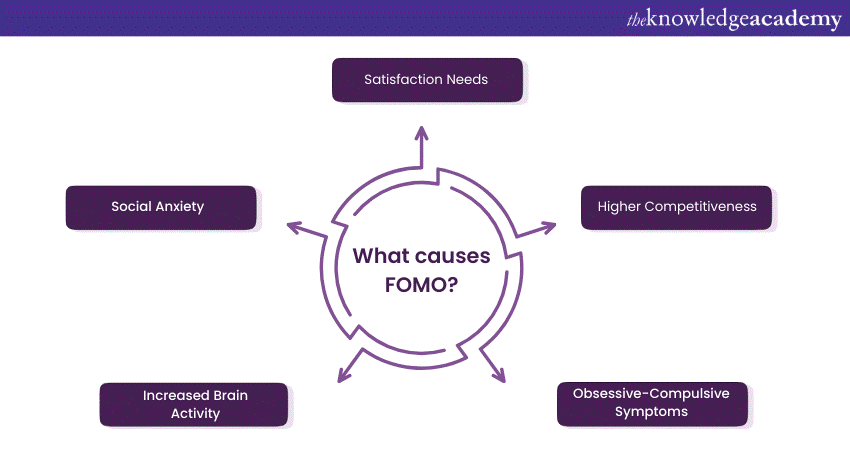
FOMO may be triggered by a more profound craving for belonging and social connection. Humans naturally desire close relationships with others and a sense of belonging to a larger community. People may experience mental and bodily distress when they feel they lack these kinds of relationships. This might have an impact on some people's general health and productivity. Even though it cannot be diagnosed, it can have particular symptoms:
1) Overscheduling (trying to be everywhere at all times)
2) Withdrawal from other people
3) Body fatigue
4) Sorrow, anxiety, or depression
5) Difficulty paying attention
6) Struggling to fall asleep
Prioritise your Mental Health: Join Our Mental Health and Wellbeing Training for a healthier mind and happier life.
Effects of FOMO
FOMO may impact your whole health and well-being. It can affect your sleep and food habits if you overcommit to social engagements and activities to avoid FOMO, which can result in:
1) Exhaustion
2) Headaches
3) Loss of interest
4) Poor work or academic performance
5) Stress
FOMO can also lead to anxiety or depression. When you have FOMO, you could go through periods of self-doubt like:
a) What will happen if I forget anything or can't make it?
b) Will missing the occasion cause me to be demeaned?
c) "Will others see me negatively because I don't follow a particular trend?"
Who is most affected by FOMO?
FOMO tends to affect teenagers and young individuals more significantly due to their increased online presence and a heightened need for social acceptance and belonging. Nonetheless, FOMO is not limited to the younger age group. Individuals who actively engage with social media are at greater risk of experiencing FOMO compared to those who use social media sparingly. The exposure to the "highlight reels" of others' lives on these platforms can contribute to this feeling. People deeply invested in their social relationships are naturally drawn to social media and are more likely to experience FOMO.
Furthermore, individuals dealing with social anxiety are susceptible to FOMO as they tend to avoid in-person social interactions and rely heavily on social media for connection and to alleviate feelings of loneliness. While FOMO likely results from a combination of factors, social media and problematic smartphone usage play significant roles. Smartphone usage is associated with concerns about how others perceive them, both negatively and positively, and it can affect one's mood adversely.
Adolescents and young individuals may be particularly vulnerable to the impacts of FOMO. When they see their friends and peers posting on social media, it can lead to comparisons and an intense Fear of Missing Out on experiences their peers are having. FOMO in some teens can contribute to issues like anxiety, depression, low self-esteem, and engaging in risky behaviours. FOMO can also intensify peer pressure, pushing teens to participate in actions they might otherwise avoid, as the still-developing teenage brain may not fully consider the long-term consequences.
Join our Handle Anxiety Masterclass and take control of your mental well-being today!
How to get over FOMO?
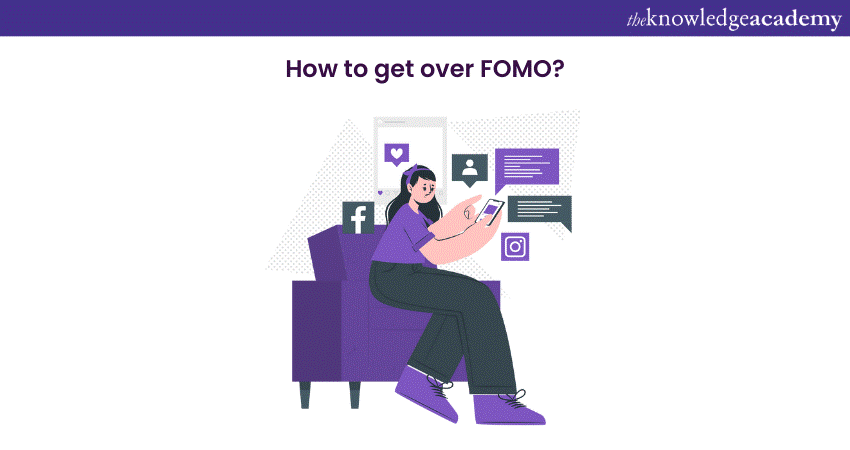
The anxiety of missing out sometimes signals a detachment from what you genuinely see as significant in your life. Working to overcome destructive cycles can frequently be a necessary step in preventing FOMO. Here are a few suggestions for you to deal with it:
1) Digital detox
Being less engaged in online activities, such as social media and breaking news, can make you more purposeful and present in your daily activities. Reconnecting with yourself and what you can be achieved by detoxing from social media may lead to FOMO. The Fear of Missing Out is a significant impact of social media applications.
Consider limiting your use of social media apps that make you feel you are missing out if going through a complete digital detox isn't possible. Remove such apps temporarily, place daily usage restrictions on them, or remove your social network of those who constantly leave you feeling down about yourself or your life.
2) Change your focus
Shifting attention from what is lacking in life to what is already there. This can involve changing social media platforms such that more postings from happy individuals appear in the feed rather than ones from unhappy people.
3) Appreciate the JOMO (Joy of Missing Out)
People with JOMO accept the decisions they have made and find delight in the current circumstance, compared to people with FOMO, who may second-guess their choices and consider whether they could be having more fun somewhere else.
Countless fantastic things are happening all the time. Being present everywhere at once is impossible. Try making the option that is best for you and owning that choice rather than worrying about what you may or may not be missing out on. Enjoy what you're doing, and remember why you chose it in the first place.
4) Remove social networking applications
Keep in mind that social media posts are frequently misleading. People are more inclined to share a snapshot of a fantastic adventure than a rant about any difficulties they may be experiencing, as opposed to the expected behaviour of just posting their finest selfies. Remember that everyone has bad days, no matter how fascinating or perfect a person's life appears.
5) Attending therapy
You may stop worrying about what you're losing out on and start feeling confident in how you spend your time by unplugging technology, refocusing your thoughts, and getting treatment from a certified mental health expert.
Conclusion
Constant FOMO could be harmful to one's physical and mental health. Enjoy what you're doing, and remember why you chose it in the first place. I hope this article has clarified Wwhat is FOMO and how to deal with it through appropriate methods that have already been described above.
Join our Handle Stress and Develop Your Resilience Training to conquer stress and build unshakable resilience for a healthier, happier you.







 Top Rated Course
Top Rated Course




 If you wish to make any changes to your course, please
If you wish to make any changes to your course, please


